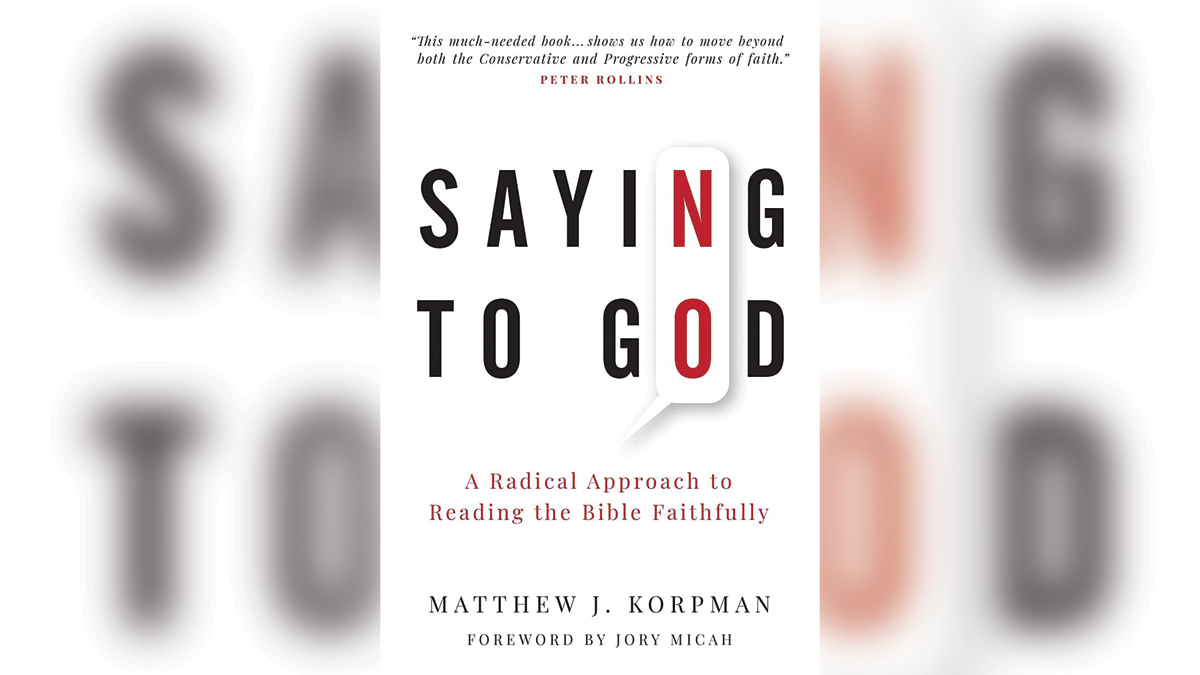Saying No to God: A Radical Approach to Reading the Bible Faithfully
Matthew J Korpman
It’s embedded in the name of God’s people throughout most of the Bible’s story. As the sun was about to rise by the Jabbok River, Jacob was given a new name by his mysterious assailant: “Your name will no longer be Jacob, but Israel, because you have struggled with God and with humans and have overcome” (Genesis 32:28, NIV). According to Matthew Korpman’s fascinating new book—Saying No to God—this affirmation of struggling faithfully with God has been overlooked too often and invites us into a better way of reading the Bible.
Of course, there are many Bible stories that we might think of in which the characters argued with God. We could reflect on Abraham bargaining with God over the impending destruction of Sodom and Gomorrah, Jonah’s petulance over Nineveh’s repentance or Thomas’ stubborn resolve to see the resurrected Jesus for himself. But Saying No to God re-reads these stories with greater nuance and depth, as well as leading us through some of the stories we might not have included in this list.
Amid the recurring formula of the Pentateuch, Psalms and Proverbs—that God blesses the righteous and punishes the wicked—we stumble across the story of Job. Ironically, it is Job’s friends who follow the “biblical” pattern, but it is Job who insists otherwise and is ultimately affirmed by God. We also spend time with Mary ignoring Jesus’ resistance to performing a miracle at a village wedding that had run out of wine (see John 2:1–12), immediately after one of the Bible’s chapters that most emphasises Jesus as God. We even are invited to see the Ninevites’ repentance as a rejection of Jonah’s message from God, with both Jonah and the heathen people suspecting that their threatened destruction did not fit with the truly merciful nature of God.
Korpman’s reading of these Bible stories demonstrates how seriously he takes the text, even while urging we read it in some different ways. Having built this foundation, the second half of Saying No to God takes up the task of using the Bible differently to address some of the controversial and troubling ways in which the Bible is used and abused in the world today, including questions with Adventist connotations like belief in hell and questions about the role of women.
For Adventist readers, Korpman’s own faith experience and background is of particular interest. Growing up in a conservative Adventist family, he assumed that the prominent evangelists he saw on Adventist TV channels—one of whom baptised him—were the Bible scholars. He discovered that the scholarly study of the Bible was something quite different only when studying at an Adventist university. This opened much larger horizons and possibilities—and led him to his current graduate studies in Religion at Yale Divinity School in Connecticut, US.
As such, Saying No to God weaves together historical and contemporary theology, with Korpman’s personal faith journey and Adventist background, including occasional quotations from Ellen White. In one sense, this makes the book feel somewhat patchy, combining the familiar with the challenging—but what is familiar and challenging will vary greatly for its different readers. On the other hand, perhaps what Korpman is doing is modelling precisely what the big ideas of theology should do. They should interact with our personal experiences and everyday lives; they should prompt us to a deeper engagement with the stories of the Bible; and they should challenge some of the dearly held assumptions of our received faith. Saying No to God also demonstrates the place that distinctly Adventist theology should have in contributing to broader Christian thinking in healthy and constructive dialogue.
How we read the Bible and then apply it to the issues of our lives and our world is a foundational project for authentic and sustainable faith. Saying No to God offers a fresh approach to this task and deserves our consideration as people called to continue to wrestle with God in and through the sacred text He has given us.






